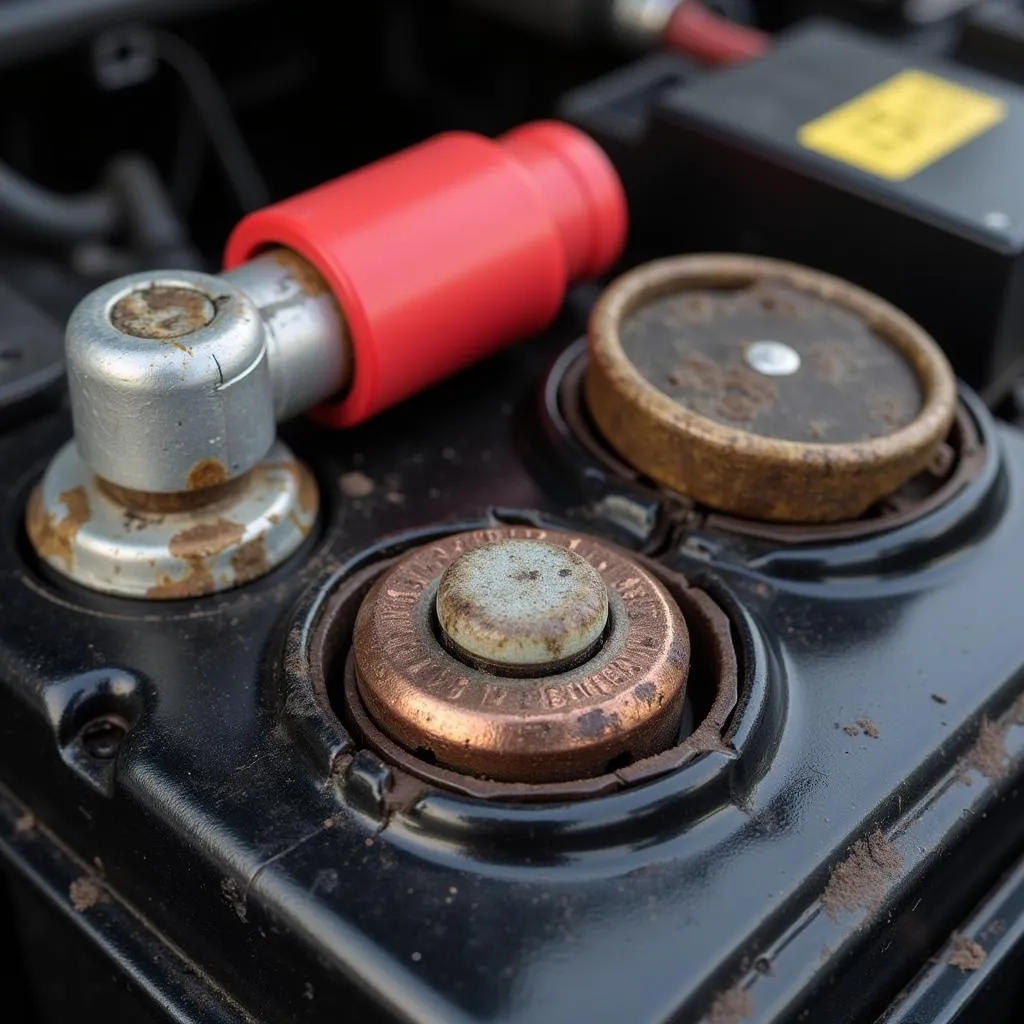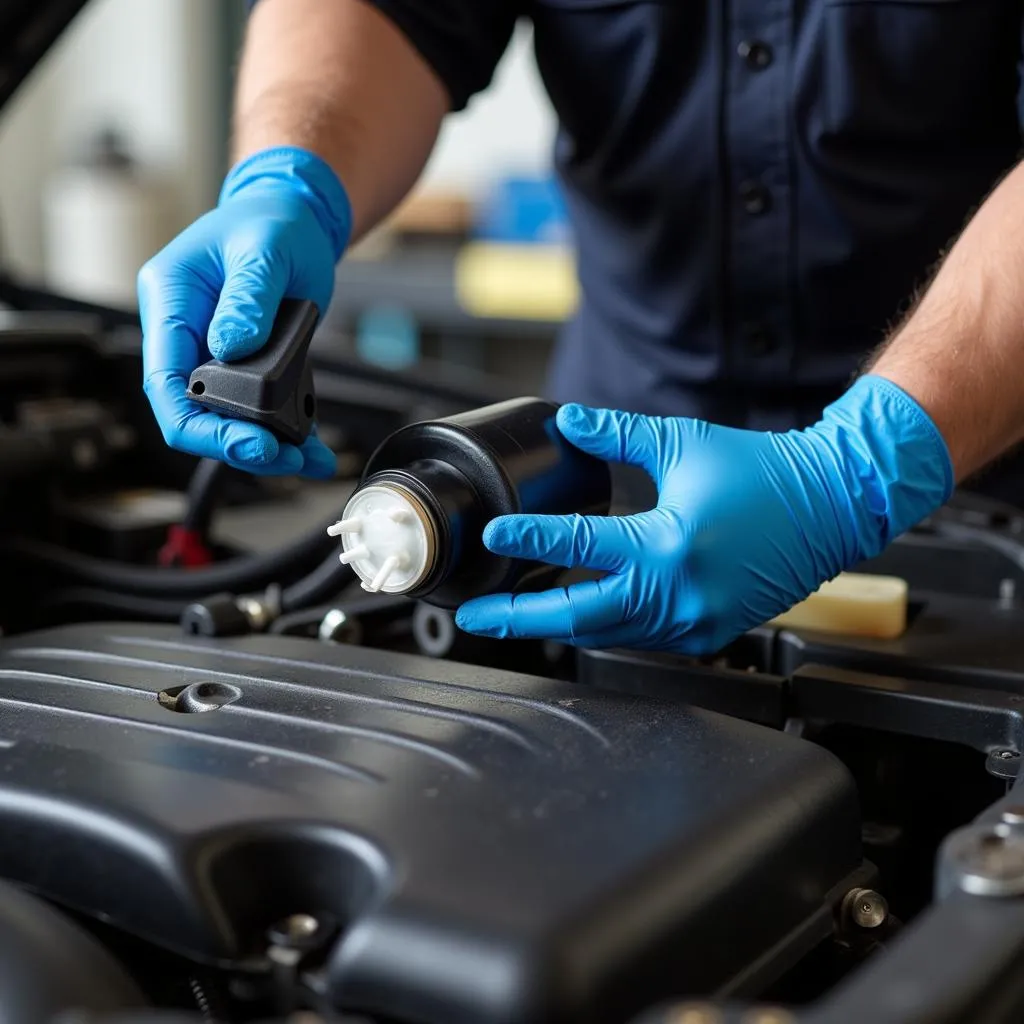You turn the key, the dashboard lights up, but nothing happens. Your car lights are on, but the car won’t start. This frustrating situation can leave you stranded and wondering what went wrong. Don’t panic! This article will guide you through the common causes and potential solutions for this common car problem.
Common Reasons Why Your Car Lights Work but Won’t Start
Several culprits could be behind your car’s starting troubles, even with the lights functioning correctly. Here are some of the most frequent causes:
1. Dead Battery or Poor Connection
While your lights might flicker on, a weak or discharged battery might lack the power to engage the starter motor. This is especially true in cold weather, as low temperatures reduce battery performance.
Signs: Dim headlights, clicking sounds when turning the key.
Solutions:
- Jump-start your car using jumper cables and a working battery.
- Check the battery terminals for corrosion. Clean them with a wire brush and battery terminal cleaner if necessary.
- Consider a battery test at an auto parts store or mechanic to determine if it needs replacing.
 Car battery terminals with corrosion
Car battery terminals with corrosion
2. Faulty Starter Motor
The starter motor is responsible for cranking your engine to life. A failing starter motor might be the culprit if you hear a clicking noise when turning the key but no engine turnover.
Signs: Clicking sounds when turning the key, no engine cranking.
Solutions:
- Starter replacement is typically the solution for a faulty starter motor. It’s recommended to seek professional assistance for this repair.
3. Ignition Switch Problems
The ignition switch, responsible for sending power to the starter, can wear out over time. A malfunctioning ignition switch can prevent your car from starting, even if the lights work.
Signs: Car lights come on but will not start, key stuck in the ignition.
Solutions:
- Diagnosing a faulty ignition switch often requires specialized tools and knowledge, making it best to consult a mechanic.
4. Fuel System Issues
A lack of fuel or a problem with the fuel delivery system can prevent the engine from starting. Even with sufficient power, your engine won’t fire up without fuel.
Signs: Engine cranks but doesn’t start, sputtering engine.
Solutions:
- Check your fuel gauge: Ensure you have enough fuel.
- Inspect the fuel pump: Listen for a humming sound when you turn the key to the “on” position. A lack of sound may indicate a faulty fuel pump.
- Check for clogged fuel filters: A clogged fuel filter restricts fuel flow to the engine.
 Mechanic inspecting car fuel filter
Mechanic inspecting car fuel filter
5. Sensor Malfunctions
Modern cars rely on various sensors to manage engine functions. A faulty crankshaft position sensor or camshaft position sensor can prevent the engine from receiving the signal to start.
Signs: Engine cranks but doesn’t start, check engine light illuminated.
Solutions:
- Retrieve diagnostic trouble codes (DTCs) using an OBD-II scanner. This can pinpoint the faulty sensor.
- Replace any malfunctioning sensors. It’s generally best to have a mechanic handle this repair.
Less Common Reasons Your Car Might Not Start
Beyond the most frequent culprits, other issues, although less common, could be at play:
- Faulty Alternator: While a bad alternator usually leaves you with a dead battery, a failing one can sometimes provide enough power for the lights but not enough to start the engine.
- Immobilizer System Malfunction: Many modern cars use an immobilizer system that prevents the engine from starting without the correct key. A malfunctioning immobilizer system can prevent the car from starting even with the correct key.
- Wiring Issues: Damaged or corroded wiring can disrupt the flow of power to essential components, including the starter.
When to Seek Professional Help
If you’ve tried the basic troubleshooting steps and your car still won’t start, it’s best to seek help from a qualified mechanic. They have the expertise and tools to accurately diagnose and repair complex car problems.
“Attempting to fix complex car problems without proper knowledge and tools can lead to further damage and costly repairs,” says John Smith, Senior Automotive Technician at ABC Auto Repair.
Preventing Future Starting Problems
Regular car maintenance is crucial to prevent future starting problems. This includes:
- Regular Battery Testing: Have your battery tested at least once a year, especially if it’s more than three years old.
- Terminal Cleaning: Keep battery terminals clean and free of corrosion.
- Timely Fuel System Maintenance: Replace fuel filters as recommended in your car’s owner’s manual.
- Promptly Address Warning Lights: Don’t ignore the check engine light. Get it diagnosed and repaired promptly.
FAQs: Car Lights On But Car Won’t Start
Q: Can a bad alternator cause my car lights to work but not start?
A: While less common, a failing alternator can sometimes provide enough power for the lights but not enough to start the engine.
Q: My car makes a clicking sound when I try to start it. What does this mean?
A: A clicking sound usually indicates a weak battery or a problem with the starter motor.
Q: Can I jump-start my car if it has a push-button start?
A: Yes, most push-button start cars have designated jump-start terminals. Consult your owner’s manual for their location.
Don’t Let Starting Troubles Leave You Stranded
Encountering car problems can be stressful. Understanding the potential reasons behind a car that won’t start, even with working lights, empowers you to take appropriate action. Remember, regular maintenance and prompt attention to warning signs can go a long way in preventing future starting issues and keep your car running smoothly for years to come.
Need help with car diagnostic tools? Learn more about how DiagXcar can assist you in diagnosing and resolving car issues.